Who are the winners and losers since Google's mobile update?
If you're involved in using SEO to drive traffic, you’ll no doubt know the hype of the build up to Google’s mobile friendly algorithm update since it was initially announced in the autumn of 2014 and finally rolled out a month ago today on April 21st, 2015. Many predicted major changes as a result of the update, with Google’s Zineb Ait Bahajji saying at SMX Munich that the upcoming mobile-friendly algorithm update would 'impact more sites than their Panda or Penguin algorithms'. Even the mainstream media picked up on it, dubbing it 'Mobilegeddon'...
So one month on what has the impact been? Has it impact been like that of a zombie apocalypse, or is it more a case of Business as Usual for most? In this post I'll look at insights from different studies which show the impact of effected websites. I'll also look at how you can review the impact using Google Analytics.
What has been the impact of the algorithm update?
It’s fair to say that the impact of the mobile update has been underwhelming for many.. Google had stated that the update would affect more queries than Panda and Penguin, and although no official numbers have been disclosed, far more volatility in the search results has been observed on previous algorithm updates.
The initial consensus from the WebmasterWorld thread since the April 2015 update seems to back this up, with typical comments including:
'No change on one of the sites I monitor, though we’ve already been mobile-friendly for some time, and mobile has completely surpassed desktop+tablet organic traffic combined within the last year.'
'[UK] If it’s rolled out – then it looks like a very small ranking factor indeed.
I have […] sites that are mobile friendly and sites that aren’t – and I can’t detect any traffic changes whatsoever on a Google + Mobile segment.'
'The joke is nothing has changed.
My sites have seen zero change. I have responsive sites and old school html sites using tables and ZERO change for any of them.
Was expecting a boost for the responsive sites and getting dinged for non-mobile friendly sites.
After one week nothing has happened.'
Who were the winners and losers?
Surveys of a defined set of keyword rankings across websites are useful for seeing the overall impact and Searchmetrics’ 'winners and losers’ report offers a useful review of the impact of these changes across a diverse keyword set:

Looking at the losers in more detail show some large declines in visibility, but remember that these aren't visits, they are falls in an index of the rank of selected keywords. Searchmetrics advises...
It's important is to take the “Ratio Mobile vs Desktop” into account. It shows the difference between the performance in Desktop rankings and Mobile rankings. The lower the ratio, the worse is this domain ranking in Mobile compared to Desktop. These domains are the losers of the Mobilegeddon update.
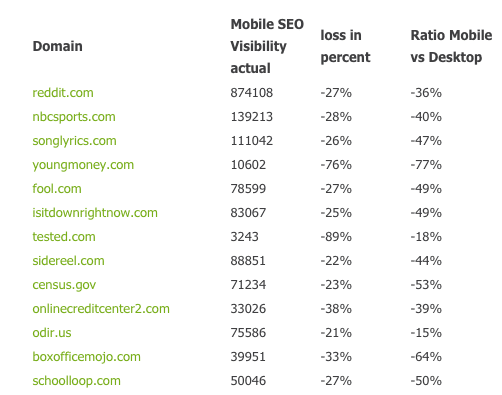
Analysis of the first week listed Next.co.uk as the website as the biggest loss in UK. Analysing it reveals how big an impact the update may have had on SEO performance, with Next.co.uk losing visibility on key generic keywords including:

Pages that were not mobile-friendly dropped on average five positions, which is enough of a decrease to significantly impact CTR and therefore share-of-voice.
Other losers included sites such as non-mobile-friendly Songlyrics: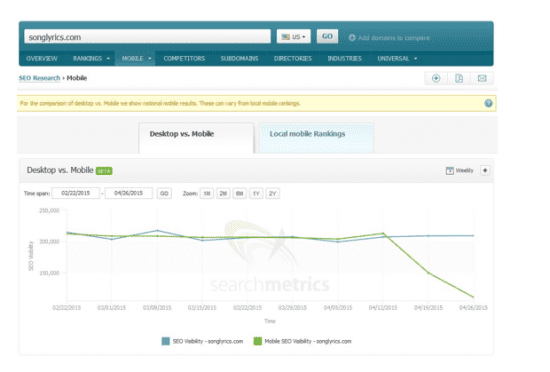
Although there were some positive results, including GQ:
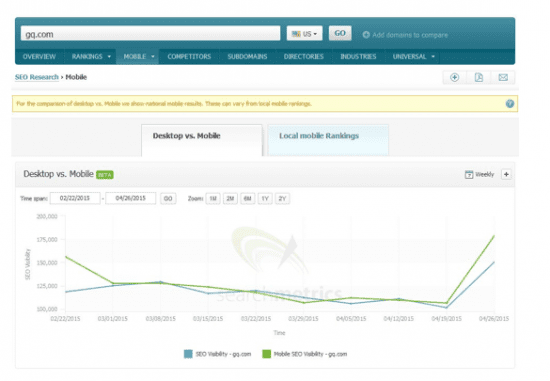
What does Google say?
It’s good that Google has given plenty of warning and education on this update. On April 21st they issued this clarification in a blog post that downplays the importance of the mobile-friendly ranking factor:
'While the mobile-friendly change is important, we still use a variety of signals to rank search results. The intent of the search query is still a very strong signal — so even if a page with high quality content is not mobile-friendly, it could still rank high if it has great content for the query'.
This information would have been useful before and might have prevented the ‘mobilegeddon’ hype, although it does explain why the impact has been less than expected.
Google suggested that the lack of impact may have also been due to a significant number of websites migrating to mobile-friendly websites following their announcement of the mobile update. However, it could be perceived that it’s in Google’s interests to make the internet as mobile-friendly as possible, meaning they purposely hyped the impact to incentivise websites into migrating to mobile-friendly platforms.
There are also suggestions that the weighting of the mobile ranking factor may be increased through time, so the reasons for moving to a mobile responsive or adaptive design are as strong as ever.
How has the update impacted your site?
You will probably know this already! But if you're asked the question and need a quantitative answer, Dave Chaffey has created a handy step-by-step guide for checking the impact of ‘Mobilegeddon’.
Within Google Analytics you can check the impact by isolating mobile traffic through the creation of a Custom Segment (formerly Advanced segments) by choosing ‘+Add Segment’ from the bar at the top:
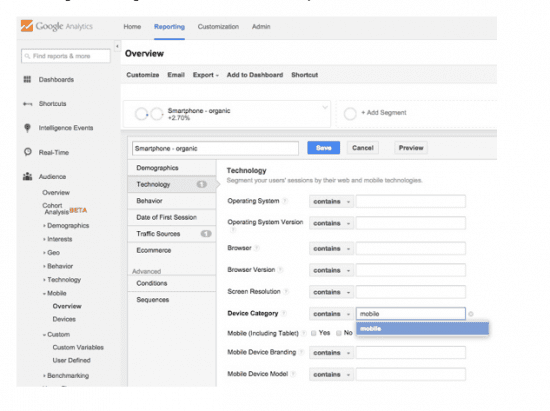
- Choose the 'Technology' segment option and then 'Mobile' from the device category.
- Organic traffic is in the 'Traffic sources' segments tab, so you'll need to click this and then choose a Medium of organic which are 'SEO' visits.
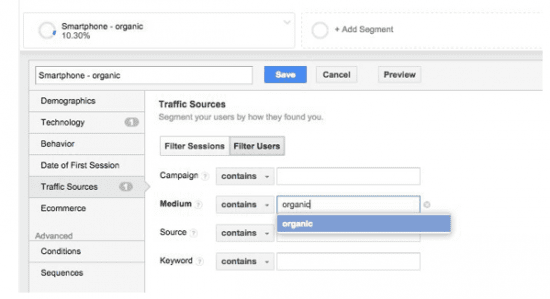
- Once you’ve saved the segment you can then review the trends over time, comparing month-on-month or year-on-year as the example below demonstrates:
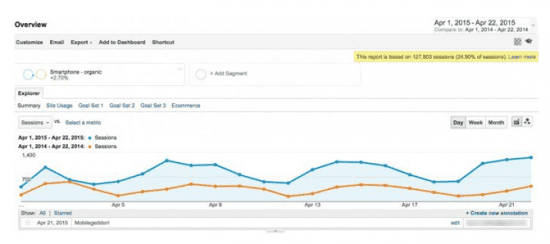
What’s next for the Mobile Update?
It’s likely that Google will roll out improved iterations of the mobile-friendly algorithm over time. There are two key ways in which Google could make improvements:
-
1. Get better at detecting whether there is a mobile experience
Google can make improvements to how it detects whether there is a mobile-friendly webpage or not. Currently it is possible to trick Google into thinking you have a mobile-friendly website and get the positional improvements even if you don’t. If you simply redirect a user to a mobile friendly page and then navigate them back to the desktop page, you will be rewarded as being classified as being mobile friendly.
-
2. Quantify whether or not that is a good user experience
There isn’t much consideration given to how good or bad the user experience is on a mobile device. Over time, we would expect Google to incorporate more user signals into qualifying how good the mobile experience is look more at behaviour metrics and search sequence, so focus must now turn from just having a mobile site, to making it as good as possible.
So that's the story of Mobilegeddon, I hope it had a happy ending for you (so far)!












